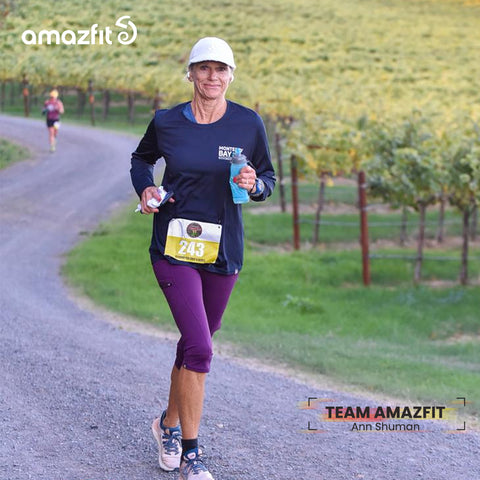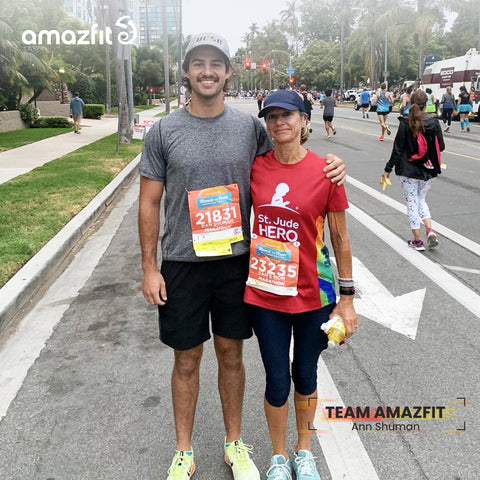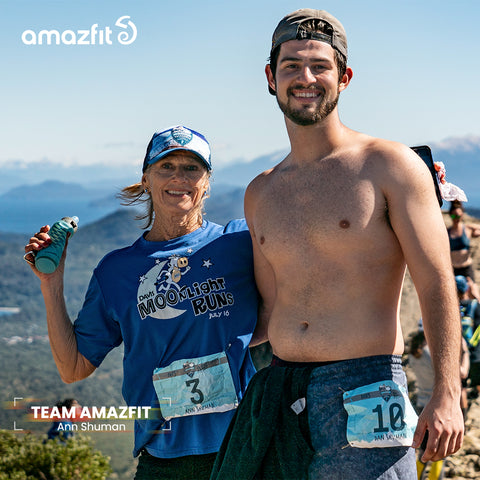Tell us about yourself.
My given name is Andreanna. Now, most people call me Ann. I was born in Crescent City, a small coastal Northern California town, but I moved to the Central Valley of California at age 17 when I went to college at the University of California, Davis. I am 67 years old, but don’t feel it. I think having kids late (at 40 and 43) helped me stay young (at heart, at least), but I am convinced being active all my life has also helped me adapt better to the changes and realities that come with aging.
What has your journey with fitness and running looked like throughout your life?
I started “working out” at a young age, practicing with the high school gymnastic team when I was 8 years old. My claim to fame was being the fourth fastest girl on the junior high track team. For a long time, we held an (unofficial) national record for the 440 yard relay. In high school, cross country distance was two miles - from school to the beach and back.
It wasn’t until college that I started running (well, jogging) longer distances. I was on the gymnastics team, working out far more hours than I studied, but I got tired of being in a smelly gym so I took a PE soccer class and an “aerobics” (i.e., running) class. It was during that aerobics class that I grew to really like jogging. By the end of the quarter, I was able to finish the “final exam” and run six whole miles.
After graduating college with a respectable degree in nutrition, I decided to go to nursing school. Running kept me sane throughout school. On Mondays we had a three-hour break between classes, and a friend and I would always run along the American River.
I started entering 10k runs and then some half marathons. I try not to call them “races” because I wanted to enjoy the entire run, not just the finish. And, I had no false expectations. I was never very fast, usually finishing around the middle of the pack. Back then, half marathons were not very popular. My first half marathon - from one town to another - had so few people and I was so slow, I lost sight of everyone, got lost, and ended up in the wrong town!
December 7, 1981. Pearl Harbor Day. 26 years old and I had never been to Hawaii. But the allure of a week-long running seminar by world-renowned running experts, culminating in the Honolulu Marathon, was too much to pass up. I was pretty sore afterwards but got such a high finishing a marathon that I did it again. In the next few years, I ran other California classics such as Big Sur, San Francisco, Napa and CIM. In the meantime, I met a really cool guy who owned a scuba diving shop and I got hooked (on the guy and scuba diving). He was game enough to run the Big Sur marathon with me in 1992. His first and my last. Or so I thought, since we got married soon after and started having kids. For several years, I didn’t run fast or very far, but I ran most every day because it actually energized me to get through the long dark, and often horrendous, nights in the Emergency Room.
Running was instrumental for me getting through my cancer treatment 17 years ago - surgery, chemo, radiation and then 5 years of oral chemo. Some days I was weak and dizzy and had to walk, but most of the time I ran, usually at 5:30 in the morning with the best friend in the world.
Running gave me strength, hope, motivation, energy, and made me feel alive. It still does.
You shared with us that you are an older runner. What keeps you running at this stage of your life?
I keep running because I can.
More significantly, I think running (and my other fitness regimens) has kept me in shape to do things that many others my age cannot even think about doing.
The Eiffel Tower: Who needs an elevator?
Bunker Hill: My son and I did it twice!
Irish dancing? Why not?
I spent the last few summers of my college years fighting forest fires. I had to train rigorously to do the three required pull ups for the “fit” test, but I was able to pass the running part without a problem.
After my kids were in college and I was retired from my job, I still ran about 5 miles a day. I was volunteering for the American Red Cross and deploying to disasters all over the country. Often I worked 12-24 hour shifts and was extremely tired, but I tried to get in a run.
Have you ever run the Boston Marathon before? What are you most looking forward to?
Ha! No, I was never fast enough. However, last year my 23-year-old son told me he was going to run the San Diego Rock ‘N Roll Marathon with his buddies. I hadn’t run a marathon in 30 years! I hadn’t planned on EVER running one again. I don’t know what possessed me, but I asked him if it was okay if his old mom came down to run the marathon too. He was all for it! So, I signed up and volunteered to raise money for St. Jude’s and in June, 2022, my son ran his first marathon and I ran my last!
Yeah, right. My last. Again!
Turns out, he swears he will never run another marathon. And I was disappointed that we did not run by the ocean at all in San Diego so I signed up for the Maui Oceanfront Marathon in January 2023.
When I found out I had qualified for Boston at San Diego, I was shocked. I applied for Boston, not thinking I would get in since my time was pretty close to qualifying time, but I gave it a shot. Here I was 66 years old and I finally qualified - without trying. I had to laugh (and make hotel reservations - just in case I got in).
In Boston, I look forward to being inspired and impressed, and I hope I can inspire at least a few people.
What has your training looked like for the Boston Marathon this year? Has your training differed over time?
I ran half marathons in Bermuda, Cape Cod, Florida and California. This Fall I did 12 half marathons in 12 weeks. I did the requisite longer runs, albeit very slowly and with a lot of walking. I was so well trained for Maui that I wasn't even sore the next day and did a Zumba class the next morning.
I have found that as I get older, I place in most of the runs I do, regardless the distance.
What are you most proud of in your running/athletic career thus far?
I swim and go to the gym regularly to keep my core strong and keep my whole body in shape. People often come up to me and comment on how my workout would “kill” them. I have had people ask me to show them exercises.
Once I was walking with my 91-year-old dad. As he huffed and puffed up a hill, he asked, “Why am I doing this? I am not training for a race or anything.” I told him that he was doing it so he would feel good TODAY. I explained how movement gets his circulation going which fuels his brain and his muscles and makes him feel better the rest of the day. He said he had never thought of his walks in that way and he thanked me for giving him that perspective.
What are your future athletic goals? Where do you want to go next?
For my 62nd birthday I ran an ironman (triathlon) without training. The big one: 26 mile run, 112 mile bike, 2.4 mile swim. It actually took three days. I divided the individual events by three and did that distance each day for three days, culminating on my birthday.
I was one of the oldest runners in Patagonia (with Vacation Races) this March. We ran at the base of volcanoes, up mountains in the Andes, and on sand dunes in 40 mph headwinds. I enjoyed it so much that I signed up to do a half marathon at night at Joshua Tree National Park on my 68th birthday in November. I hope to go to Iceland this summer and run some breathtaking volcanoes, glaciers and parks. I have a bunch of trail runs scheduled (including a 21 miler with 4,000-foot elevation change and 7 hills), and my annual half marathons in Northern California. And, I may get my Zumba instructor certification and join the local ladies golf team (if I can get my chip shots down).
What would you tell someone running their first marathon?
It is hard. Distance athletic events are as much mental as physical and you need to train for both aspects.
Figure out WHY you want to do it. If the desire for the challenge comes from within you, I would say “you got this.” If it comes from external sources, like Social Media or friends at work doing it, then I might encourage you to rethink it.
Then I would say to start slowly and increase gradually. Run with a training partner or, better yet, your best friend.
Make a training plan but don’t look at failures. Instead, celebrate even the small victories like a longer run, a faster pace, or the fact that you went out when it was rainy and cold and you still put in 10 miles!
REST and RECOVER. It took me nearly a lifetime to learn this. My kids say I haven’t learned it yet!
ONE BABY STEP AT A TIME. When you see over 50,000 steps on your Amazfit watch, you will forget everything except, WOW. THAT IS A LOT OF STEPS! I even have a bracelet that I got as a gift during cancer treatment that says, One Step at a Time, and I wear it every run.
What are some things you do in your daily life that keeps you healthy as an older athlete?
I spoil myself. And I push myself.
I bike almost everywhere (Davis is known for its bikes). I spend very little time indoors.
My diet isn’t that great, but I am trying to eat more quality protein.
I exercise - a lot. I mix it up and do a wide variety of workouts on top of my regular running and swimming. I make sure I do core work too (I have had 5 herniated discs in my back and this keeps me pain free).
What are you hoping to accomplish at Boston?
Not finish last. I just don’t want the cameras on me while they shut down the course!
I hope to inspire others.
What would you tell people your age who don’t think they can run a marathon?
Again, with a person of any age, I would first ask where their motivation comes from. If their desire comes from the heart and gut, it doesn’t matter what I say! They can do it.
My common sense advice to an older person facing a daunting challenge is much like what I would tell a younger person: You can do it, but there are things to consider. They include:
Don’t expect to feel like you did 20 or even 10 years ago! Accept and deal with the changes that come with age. You will be slower, it will be harder!
Have a running partner that never pressures you to go faster, farther, or at all if you are not up for it on a particular day. Running with earbuds (a good book or your favorite songs) is a good substitute. My recent runs in Patagonia were hard for me, but my son kept me laughing all the time!
Listen to your body. It is old and wise. Set reasonable goals that make you feel good when you accomplish them, not bad when you don’t.
Cross train with activities you like (running is only one of two to four workouts in my daily routine). Good for the body as well as the mind. Zumba makes my mind more tired than my arms and legs!
Baby steps. It is easy to try to do too much, but that is when you get into trouble. You are old, give yourself a break and go slowly! Rest and recovery is as important as that long training run.
Reward yourself. Mine is often a coffee shop after a 16 mile run and walk the last two miles home.
Use as much or as little technology as you want. There are watches and gizmos to help you keep your goals. There are hydration packs, sleek and racy outfits, social media to post every step of your journey, too many shoes and colors to choose from (get help from the running shoe store), and even display cases for your fancy medals. The key is to find what helps you stay motivated and safe and injury free.
Eat more high-quality protein. As we age, long workouts and extra efforts often break down muscle, rather than build it up. It is possible to gain strength and endurance and stamina, but it takes more effort! Eat a healthy diet of course but add more protein. And purposefully drink a bit more water.
Take a handkerchief. You laugh. Your nose invariably runs and your eyes might water. Especially when it is cold.
Watch the ground. Seriously. It is hard to focus on where you are stepping, especially on trail runs and the scenery is breath-taking, but do be careful you don’t trip and fall. Very important when you are tired at the end of a run and your feet start dragging. Take a break or slow down. Get a drink.
Stay well and happy running!





